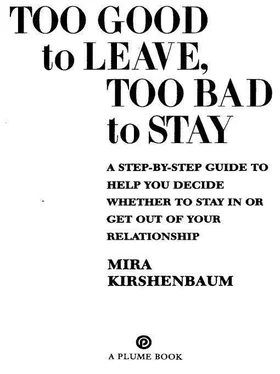Kirshenbaum, Mira - Too Good to Leave, Too Bad to Stay
Здесь есть возможность читать онлайн «Kirshenbaum, Mira - Too Good to Leave, Too Bad to Stay» весь текст электронной книги совершенно бесплатно (целиком полную версию без сокращений). В некоторых случаях можно слушать аудио, скачать через торрент в формате fb2 и присутствует краткое содержание. Жанр: Психология. Описание произведения, (предисловие) а так же отзывы посетителей доступны на портале библиотеки ЛибКат.
- Название:Too Good to Leave, Too Bad to Stay
- Автор:
- Жанр:
- Год:неизвестен
- ISBN:нет данных
- Рейтинг книги:3 / 5. Голосов: 1
-
Избранное:Добавить в избранное
- Отзывы:
-
Ваша оценка:
- 60
- 1
- 2
- 3
- 4
- 5
Too Good to Leave, Too Bad to Stay: краткое содержание, описание и аннотация
Предлагаем к чтению аннотацию, описание, краткое содержание или предисловие (зависит от того, что написал сам автор книги «Too Good to Leave, Too Bad to Stay»). Если вы не нашли необходимую информацию о книге — напишите в комментариях, мы постараемся отыскать её.
Too Good to Leave, Too Bad to Stay — читать онлайн бесплатно полную книгу (весь текст) целиком
Ниже представлен текст книги, разбитый по страницам. Система сохранения места последней прочитанной страницы, позволяет с удобством читать онлайн бесплатно книгу «Too Good to Leave, Too Bad to Stay», без необходимости каждый раз заново искать на чём Вы остановились. Поставьте закладку, и сможете в любой момент перейти на страницу, на которой закончили чтение.
Интервал:
Закладка:
If you’ve been suffering in an iffy relationship because of something your partner does, you need to ask yourself, “Have I made it clear to him how his life will be better if he changes?” If his life won’t be better, why should he change? If you haven’t made it clear to him how his life will be better, why should you expect he’ll want to change?
Therapy. Some people need therapy to change. The statistics are that about two-thirds of the time a good therapist can succeed in producing change where the people themselves have tried and failed. The question is what constitutes a good therapist, because your partner should certainly go to one before you give up on his changing.
Here’s what you should look for. Some good signs are
• Someone you know says this therapist has helped her with a similar problem in concrete ways.
• The therapist offers a plan that focuses on helping you reach the goals you’ve set, and it’s clear to you how what the therapist does will help you reach your goals.
• This therapist uses a variety of methods depending on your problem and who you are.
• You have an ongoing sense that this therapist is more often than not helping you feel better in your life and helping your life work better.
Some bad signs are
• There’s no change in your life or how you feel or what you do after four sessions, or things actually get worse.
• The therapist seems uninterested in the concrete realities of your current life.
• The therapist is focused exclusively on ways you’ve been damaged, instead of on your needs or strengths.
• The therapist seems to have one all-purpose theory or “answer” that explains everything.
So before you say your partner can’t change in the specific way that makes your relationship too bad to stay in, my personal rule of thumb is that a good therapist has had a crack at it and it still hasn’t changed. Good therapists always make some real difference but they can’t fix all things.
So what do you do about question #18, which asks if your partner can change? This guideline emphasizes the positive:
GUIDELINE #18
If your partner shows a real sign of being able to change with respect to a problem that makes your relationship too bad to stay in, there’s a good chance there’s something healthy and alive at the core of your relationship and you won’t be happy if you give up on it at this point. Quick take: It’s the ability to change that turns frogs into princes.
The point of this guideline is that the ability to change is very, very good news.
But what if your answer to question #18 is no? That’s not necessarily bad news. Remember, we’re talking about someone who has acknowledged there’s a problem and demonstrated a solid willingness to deal with it. With someone like this you don’t give up hope, not until you learn a lot more about the situation. A therapist is a doctor of the mind, and doctors are virtually commanded to look for the possibility of someone becoming healthy no matter how sick they happen to be at the moment.
So even if your partner hasn’t yet shown signs that he can change, as long as he’s passed the acknowledgment and willingness to change tests, there’s always the possibility of change in the future. Whether that change will actually come and whether it’s enough for you are important questions, but I think they can be put off until later. Right now, because your partner’s passed the acknowledgment and willingness to change tests, people in your situation make it clear that you can afford to wait and see what happens.
By the time you get to the end of this book you’ll have explored all the possible areas that clearly point to reasons you’ll be happiest if you leave. If none of them apply, including the deal breakers we’ll get into next, then your relationship is most likely too good to leave.
11
Let’s Call the Whole Thing Off
Issue: Personal Bottom Lines
At the very beginning of this book I said that the truth about your relationship you’ll discover here is a truth you’ll know when you see it. Up until now, I’ve helped you probe for this truth by bringing to your attention issues I’ve learned are important in deciding whether to stay in or leave an iffy relationship. Now it’s time for a brief change of pace for this chapter only: instead of my bringing an issue to your attention, here you’ll have the opportunity to bring a custom-tailored issue to your own attention.
STEP #19: DRAWING THE BOTTOM LINE
If you’re trying to decide what to do with an iffy relationship, you want to avoid two mistakes. You want to avoid leaving when you’d really be happiest staying. And you want to avoid staying when you’d really be happiest leaving. Right now, let’s focus on avoiding the second mistake.
Guess what one of the biggest differences is between people who stayed when they should have left and people who avoided this mistake.
People who were happy with what they did had said to themselves, in effect, “What’s a personal bottom line for me? Has my partner gone over the line?” And they knew what their personal bottom lines were, they saw that their partners had gone over the line, and they were willing to act on that knowledge.
People who were unhappy, by and large, had done none of this. They couldn’t or wouldn’t say what their bottom lines were, they couldn’t or wouldn’t acknowledge that their partners had gone over the line, and in any case they weren’t willing to act on any transgression.
A Backdoor Accomplice
What happened next to people who ignored their bottom line was tragic. If there’s something that’s really a bottom line for you and your partner crosses it and you don’t act on it, then you’re performing an act of psychological self-mutilation. It’s as if you’d say, “I felt that that was completely unacceptable and part of me still feels that way, but then he did that and yet I couldn’t or wouldn’t do anything about it. So what right do I have anymore to say that that was my bottom line?”
And then in a weird, sad way you become a backdoor accomplice to whatever it is your partner does. It’s as if you were saying, “That ruins the relationship for me but I give you permission to do it anyway and I give myself permission to do nothing about your doing it.” You might as well just say, “Let’s set things up so we can hate each other.”
Your complicity traps you in the relationship and makes you feel you’ve betrayed yourself. It’s psychologically devastating. Children who’ve been sexually abused often have this kind of experience. They too had a “personal bottom line,” a boundary that they knew should never be violated, but their powerlessness as children made it impossible for them to protect themselves. And so they often develop a sense of themselves as having complicity in their own violation.
I realize this is an extreme example, but not acknowledging your bottom lines and not acting when they’re violated has permanently damaging psychological consequences.
What’s My Line?
You must know what your personal limits are, and if your partner’s crossed the line you must act on them.
What is a personal bottom line actually? We’re so used to “stating” our bottom lines that many people make a crucial mistake here. They think of a bottom line as something you assert, as if it’s about somehow generally standing up for yourself, as if you could stand up for yourself by “issuing” a series of bottom lines.
But this is premature. Before you “state” your bottom line, you have to discover it. It’s not like you wake up one morning and “decide” that if your partner does that then it’s all over between you. Instead, that being your bottom line is something you learn about yourself. Experience with the things that happen to you and the ways you react to them teach you that when someone does that, things are in fact all over for you.
Читать дальшеИнтервал:
Закладка:
Похожие книги на «Too Good to Leave, Too Bad to Stay»
Представляем Вашему вниманию похожие книги на «Too Good to Leave, Too Bad to Stay» списком для выбора. Мы отобрали схожую по названию и смыслу литературу в надежде предоставить читателям больше вариантов отыскать новые, интересные, ещё непрочитанные произведения.
Обсуждение, отзывы о книге «Too Good to Leave, Too Bad to Stay» и просто собственные мнения читателей. Оставьте ваши комментарии, напишите, что Вы думаете о произведении, его смысле или главных героях. Укажите что конкретно понравилось, а что нет, и почему Вы так считаете.












